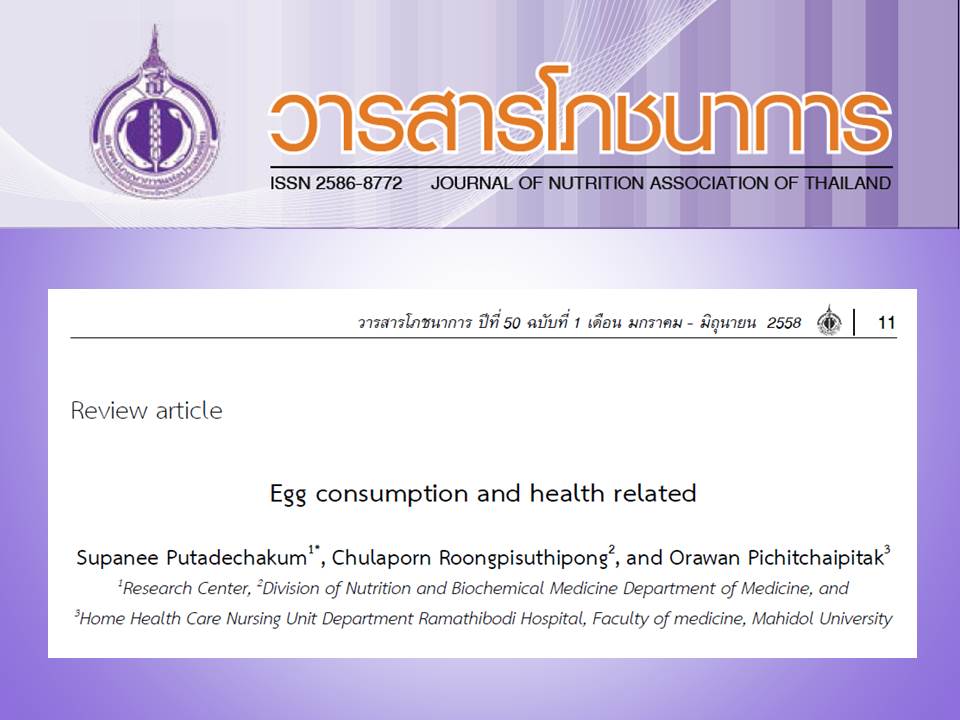Egg consumption and health related
Abstract
Eggs are the common food available for all years round and not expensive. Eggs are among the most nutritious foods plenty of the nutrients needed by our bodies. Although their high cholesterol content in egg yolks (205 mg/egg equivalent to 68 % of the recommended daily intake). Some believed that if they ate cholesterol, that it would raise cholesterol in the blood and contribute to heart disease. But the fact that it isn’t that simple. The more you eat of cholesterol, the less your body produces instead. The effect of egg consumption on blood cholesterol is minimal on blood levels of total cholesterol and harmful LDL cholesterol than does the mix of trans fats and saturated fats in the diet. Recent research has shown that one a day of egg consumption does not increase heart disease risk in healthy individuals and can be a part of healthy diet by preventing some types of strokes. People who have difficulty controlling their total and LDL cholesterol, should be cautious about eating egg yolks by using cholesterol-free egg substitutes, which are made with egg whites since egg whites contain no cholesterol. Most epidemiological research revealed that studies large populations over time and analyzes their diets and health has found no connection between eating eggs and increases in heart disease. One thing should be considered is the cleanness of egg to prevent risk of a Salmonella infection from eggs.
References
2. พูนศรี เลิศลักขณวงศ์. การบริโภคไข่ [อินเตอร์เน็ต]. 2548 [เข้าถึงเมื่อ 10 มกราคม 2558]. เข้าถึงได้จาก: https:// nutrition. anamai.moph.go.th/temp/main/view.php?group=1&id=599.
3. Kris G. Eggs and cholesterol – how many eggs can you safely eat? [internet]. 2014 [cited 2015 Feb 3]. Available from: https://authoritynutrition.com/how-many-eggsshould-you-eat/.
4. Kresser C. Cholesterol doesn’t cause heart disease [internet]. 2014 [cited 2015 Feb 10]. Available from: https://chriskresser.com/cholesterol-doesnt-cause-heart-disease.
5. Kendrick M. Why the cholesterol-heart disease theory is wrong [internet]. 2002 [cited 2015 Jan 20]. Available from: https://www.thincs.org/Malcolm. choltheory.htm.
6. Rong Y, Chen L, Zhu T, et al. Egg consumption and risk of coronary heart disease and stroke: Dose-response metaanalysis of prospective cohort studies [internet]. 2013 [cited 2015 Jan 10]. Available from: https://dx.doi.org/10.1136/bmj.e8539.
7. Hu FB, Stampfer MJ, Rimm EB, Manson JE, Ascherio A, Colditz GA, et al. A prospective study of egg consumption and risk of cardiovascular disease in men and women. JAMA. 1999;281(15):1387-94.
8. McNamara DJ. Dietary cholesterol and atherosclerosis. BBA. 2000;1529(1-3):310-20.
9. The Nutrition Source. Eggs and heart disease [internet]. 2014 [cited 2015 Mar 10]. Available from: https://www.hsph.harvard.edu/nutrition source/eggs/.
10. Fernandez ML. Dietary cholesterol provided by eggs and plasma lipoproteins in healthy populations. Curr Opin Clin Nutr Metab Care. 2006;9:8-12.
11. Djousse L, Gaziano JM. Egg consumption and risk of heart failure in the physicians’ health study. Circulation. 2008;117:512-6.
12. Djoussé L, Gaziano JM. Egg consumption in relation to cardiovascular disease and mortality: the physicians' health study. Am J Clin Nutr. 2008;87(4):964-9.
13. Fuller NR, Caterson ID, Sainsbury A, Denyer G, Fong M, Gerofi J, et al. The effect of a high-egg diet on cardiovascular risk factors in people with type 2 diabetes: the diabetes and egg (DIABEGG) study-a 3-mo randomized controlled trial. Am J Clin Nutr. 2015;101(4):705-13.
14. Roongpisuthipong C, Klangjareonchai T, Roongpisuthipong W, Putadechakum S, Sritara P. Effect of egg consumption in overweight and obese hypercholesterolemic women. J Nutr Food Sci [internet]. 2012 [cited 2015 Mar 18];2:163. Available from: https://ajcn.nutrition.org/content/early/2015/02/11/ ajcn.114. 096925.full.pdf+html.
15. Klangjareonchai T, Putadechakum S, Sritara P, Roongpisuthipong C. The Effect of egg consumption in hyperlipidemic subjects during treatment with lipid-lowering drugs. J Lipid [internet]. 2012 [cited 2015 Mar 8];2012:672720. Available from: https://www.hindawi.com/journals/jl/ 2012/672720/.
16. Putadechakum S, Phanachet P, Pakpeankitwattana V, Klangjareonchai T, Roongpisuthipong C. Effect of daily egg ingestion with Thai food on serum lipids in hyperlipidemic adults. ISRN Nutr [internet]. 2013 [cited 2015 Mar 18];2013:580213. Available from:https://www.hindawi.com/journals/isrn/2013/ 580213/.
17. Techakriengkrai T, Klangjareonchai T, Pakpeankitwattana V, Sritara P, Roongpisuthipong C. The effect of ingestion of egg and low density lipoprotein (LDL) oxidation on serum lipid profiles in hypercholesterolemic women. Songklanakarin J Sci Technol. 2012;34(2):173-8.
18. Blessoa CN, Andersena CJ, Barona J, Volek JS, Fernandez ML. Whole egg consumption improves lipoprotein profiles and insulin sensitivity to a greater extent than yolk-free egg substitute in individuals with metabolic syndrome. Metabolism. 2013;62(3):400–10.
19. ดร.พรศรี เหล่ารุจิสวัสดิ์. ภาพรวมอุตสาหกรรม ไข่ไก่ของโลกและไทย 2552-2556 [อินเตอร์เน็ต]. 2557 [เข้าถึงเมื่อ 22 มีนาคม 2558]. เข้าถึงได้จาก: https://www.egg-thailand.com/upload/images/Document/สถิติ/ภาพรวมปศุสัตว์โลกและไทย_2557_ไข่.pdf.

Downloads
Published
How to Cite
Issue
Section
License
Upon acceptance of an article, copyright is belonging to the Nutrition Association of Thailand.


